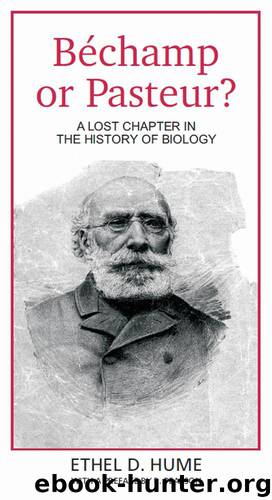Bechamp or Pasteur? by Hume Ethel & Pearson R

Author:Hume, Ethel & Pearson, R. [Hume, Ethel]
Language: eng
Format: epub
Publisher: gorgontype.com
Published: 2010-05-22T00:00:00+00:00
Who gave the correct diagnosis of the silkworm diseases Pébrine and Flacherie – Béchamp or Pasteur?
In view of the above, Pasteur’s claim of priority in a correct diagnosis of the two silkworm diseases – repeated on p.11 of his Etudes sur la Maladie des Vers-a-Soie – is entirely without foundation.
*
10.
Laboratory Experiments
AS WE HAVE ALREADY SEEN, at the time when Béchamp and Pasteur turned their attention to the subject of fermentation, only the vaguest conceptions were held in regard to living matter. Grand names were given, such asprotoplasmandblastéme, but so little was known that the albuminoids were believed to be always identical.
Virchow had tried to simplify matters by declaring that the living units of animal and vegetable forms are the cells of the body, and while Henle advanced considerably further by stating that, on the contrary, the cells are themselves built up by minute atoms, the molecular granulations, just distinguishable within them. Schwann had also taught that the atmosphere is filled with infinitesimal living organisms.
Then Béchamp and Pasteur appeared on the scene, the latter first of all affirming the spontaneous origin of ferments, while at the same time Béchamp irrefutably demonstrated that yeast and other organisms are airborne.
Finally Pasteur, converted by Béchamp’s illuminating views, became enthusiastic about atmospheric germs and, as we have seen, before a fashionable assembly of the elite claimed for himself all the credit for their elucidation. Yet so little was he really enlightened that we find him soon afterwards denying the parasitic origin of a complaint,pébrine, which was genuinely provoked by a parasite, while in the opposite direction his conception of living matter was no more advanced than the old-fashioned view that held the living body to be nothing more than a kind of chemical apparatus. For him, the body contained nothing actually alive; its wonderful workings never suggested to him living autonomous agents.
Of course, to be fair, it may be said that there was no reason why Pasteur should have understood the body. He never received any medical, physiological or biological training, and had no pretensions to being a naturalist. Chemist though he was, he seems to have had no aptitude for the branch of science to which he turned his attention. When he took his degree of Bachelor of Science, his examiner appended a note to his diploma, stating that he was only ‘mediocre in chemistry’.
He does not seem even to have been particularly quick in grasping the ideas of other people, for we have seen what a long time it took before he realised the correctness of Béchamp’s explanation ofpébrine.
It was in worldly wisdom that his mind was acute. Fortune favoured him, and he was always on the alert to seize opportunities; but, sad to say, it seems that he was not above pushing himself at someone else’s expense, even though the progress of science might be thereby hampered, and we can only deplore this misuse of his admirable persistence and energy.
While Pasteur learned nothing more about life than the fact that there are living organisms in the air, Professor Béchamp continued his untiring experiments.
Download
This site does not store any files on its server. We only index and link to content provided by other sites. Please contact the content providers to delete copyright contents if any and email us, we'll remove relevant links or contents immediately.
| Anatomy | Animals |
| Bacteriology | Biochemistry |
| Bioelectricity | Bioinformatics |
| Biology | Biophysics |
| Biotechnology | Botany |
| Ecology | Genetics |
| Paleontology | Plants |
| Taxonomic Classification | Zoology |
Sapiens: A Brief History of Humankind by Yuval Noah Harari(14333)
The Tidewater Tales by John Barth(12635)
Mastermind: How to Think Like Sherlock Holmes by Maria Konnikova(7290)
Do No Harm Stories of Life, Death and Brain Surgery by Henry Marsh(6914)
The Thirst by Nesbo Jo(6891)
Why We Sleep: Unlocking the Power of Sleep and Dreams by Matthew Walker(6668)
Life 3.0: Being Human in the Age of Artificial Intelligence by Tegmark Max(5521)
Sapiens by Yuval Noah Harari(5335)
The Longevity Diet by Valter Longo(5045)
The Body: A Guide for Occupants by Bill Bryson(5042)
The Rules Do Not Apply by Ariel Levy(4918)
The Immortal Life of Henrietta Lacks by Rebecca Skloot(4560)
Animal Frequency by Melissa Alvarez(4434)
Why We Sleep by Matthew Walker(4405)
The Hacking of the American Mind by Robert H. Lustig(4345)
Yoga Anatomy by Kaminoff Leslie(4338)
All Creatures Great and Small by James Herriot(4285)
Double Down (Diary of a Wimpy Kid Book 11) by Jeff Kinney(4247)
Embedded Programming with Modern C++ Cookbook by Igor Viarheichyk(4149)
